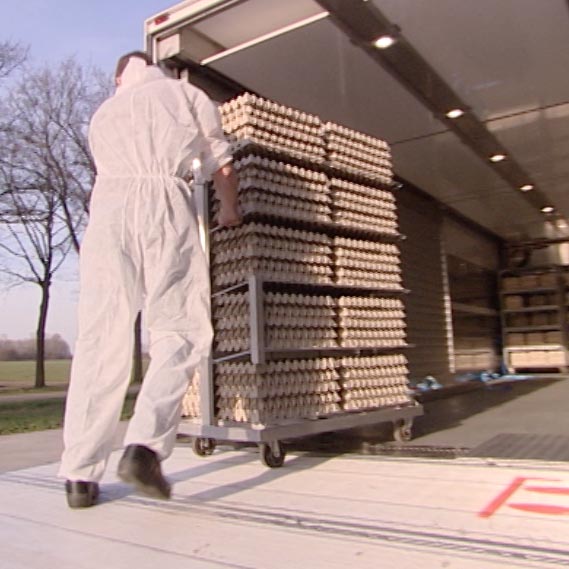Despite outbreaks of bird flu this year, Sweden, Germany and Belgium permitted the transport of hatching eggs to broiler producers. This is in the interest of animal welfare. The transport of live animals is no longer permitted. Allowing transport to continue should be the practice in other countries, too. In this case, the One2BornSystem is an asset, as well as offering other benefits.
Unfortunately, outbreaks of bird flu are sharply increasing. In the countries around the Netherlands, the number of bird flu infections is rising and experts expect the risk of bird flu to remain present for another few months. In the event of an outbreak of bird flu, the transport of day-old chicks is prohibited in Europe, and logically also in the Netherlands. “At the moment, that is. But things can change quickly,” says Huub van Santvoort, from One2Born. “During an outbreak In Sweden, the authorities have permitted the transport of eggs that have been incubated for up to 18 days since early 2021. The legislation has been amended to allow this. Later this year, Sweden was joined by Belgium and a number of federal states in Germany.” The authorities in these countries permit the transport of hatching eggs for reasons of animal welfare. “Once the eggs have been placed in the incubator at the hatchery, they hatch after 19 to 21 days. If an outbreak of bird flu stops the transport of live poultry, such as day-old chicks, and the hatching eggs hatch anyway, the resulting circumstances are not in the interests of animal welfare. The governments in these countries see this as unacceptable.”
Hatching in the poultry house avoids many problems
Transporting hatching eggs from the hatchery to the poultry farm where the chicks hatch in the poultry house is safe and prevents damage. “This also applies to the 18-day old hatching eggs sent to broiler farmers in our One2Born hatchholder. The future chicks are protected in the sterile environment of their own egg and in sterile containers. This means the risk of cross-contamination during transport is zero,” says van Santvoort. By developing the One2Born system, Huub and his colleagues are working towards improving animal welfare in the broiler industry. “The One2Born system, where the chicks hatch in the poultry house, represents a significant improvement in animal welfare. The chicks suffered no stress during transport, and have early access to fresh water and feed. Hardly any antibiotics need to be administered.” In-house hatching is the socially acceptable system of the future, according to Van Santvoort. “It’s clear that authorities are increasingly taking animal welfare into account in their decisions. We hope that, following the lead of Sweden, Germany and Belgium, the Dutch government and authorities in other countries will also permit the transport of hatching eggs in surveillance zones or temporary buffer zones around sites of bird flu outbreaks. This move is in the interests of chick welfare, and is a much needed social development.”


